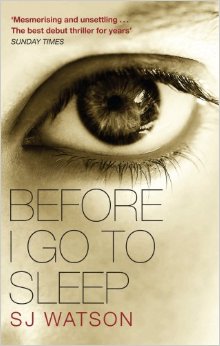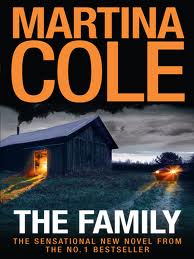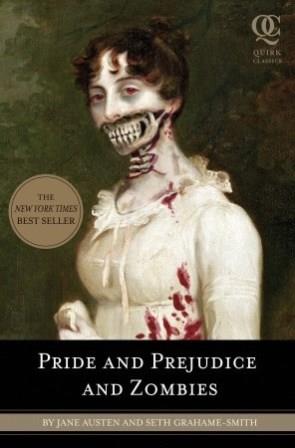
When I first heard about this on the TV Book Club I was intrigued and immediately added it to my Amazon wish list.
Fast-forward a few months and I was delighted to receive it as a birthday gift. This is S. J. Watson’s first novel and can best by described as a psychological thriller.
What’s it about?
When Christine goes to sleep, she forgets everything that has happened to her that day. Even more frighteningly, she has no memory of events before that day and wakes up every morning believing she is a young woman or even a child. Discovering her body is nearly 50 is always a tremendous shock; discovering the man sharing her bed is her husband, Ben, is an equal shock. She may not know who she is, but at least she can trust Ben. Or can she?
I found the central concept reminded me of ‘Memento’, a film I absolutely love, and I was keen to see how Watson would develop this premise.
Ooh. Sounds good. How does it begin?
The opening chapter was chilling and effectively established the central themes of the story. Christine’s fear is believable, given her situation, and portrayed convincingly as she ‘discovers’ who she is, without actually remembering her history or her present. Watson eases the reader into her world by dint of following her through a ‘normal’ morning which ends with a shock and an opportunity to learn a little more about her recent past. I defy anyone to put the book down at this point!
By the end of the chapter, Watson has introduced Ben, Christine and Dr Nash, who are the main characters in the story. I liked that Christine is not purely reliant upon Ben but has established another relationship, although of course she doesn’t remember doing this and the story of her connection with Dr Nash has to be explained to her by him. This set-up encourages Christine’s self-doubt and paranoia as she realises afresh each day that she cannot and does not fully trust either of the men who seem to hold the key to her past, especially when they begin to disagree. This helps to create a genuinely compelling read as the reader has to join Christine in questioning everything she has been told. Her desperate search for ‘real’ validation of the things she has been told is believable and makes her an extremely sympathetic character. It also helps that this is written in the first person.
This first chapter, headed ‘Part One: Today’, works as a kind of prologue to the main parts of the book and I felt that the structure worked really well. Later in the story I reread parts of the prologue in a new light and it all fit together beautifully. The second part of the book is in the form of a journal which means that the realism is lost slightly for me. This is because Christine does not just write what happens, but records entire conversations in minute detail. Personally, whenever I actually think about that, I find it jolts me out of the fiction I’m trying to engross myself in. However, this is a typical conceit and I do not imagine that most readers will find it problematic.
How does the story unfold?
Watson’s, and therefore Christine’s, writing is easy and enjoyable to read with slight lyrical touches adding to the pleasant style. I found this story very easy to read and would have to make myself find a stopping point so that I actually got some sleep at night! Perhaps to help justify Christine’s ability, Watson makes her a writer, too. This decision also helps to make the journal more convincing as a plot device.
As the story continues and Christine seems to take some steps towards knowledge and recovery, the sense of threat that has pervaded the novel from the beginning grows stronger. Is she paranoid or truly in danger? The plot twists as the story moves towards the end are daring and, I think, quite unpredictable. (It is difficult for me to say for certain as I confess to having cheated and peaked ahead a couple of times in my impatience!) There was only one point that I felt was a little unconvincing but it did not detract from what was, overall, a chilling denouement.The ending works well in that there is a clear resolution in terms of Christine’s relationships, but not in terms of her memory. I liked that Watson took a middle course and did not make the ending completely positive or negative. Given the events of the plot, ending at the point where he did made perfect logical sense and means that readers can make their own decision regarding Christine’s prognosis.
Additional notes
The central issue of memory loss is one that Watson has researched, but because the only discussions about it focus on what is relevant to Christine, it never feels that the story has been put to one side in order to simply inform the reader about the issue. After reading this I read up on a couple of the characters that Christine’s memory loss was inspired by and it seems that, despite the severity of her condition, Watson has not exaggerated: horrifyingly, lives like Christine’s are possible, which gives the novel a real emotional depth.
My edition has some extra notes at the back: a set of reading group questions, a Q and A with the author, an explanation of the inspiration behind the story and a list of Watson’s favourite reads. The reading group questions are fairly standard and simply encourage you to think about the issues and relationships explored in the story. As I was already doing that, I did not find them particularly helpful. The Q and A with the author was interesting, as was the explanation of his inspiration, although I certainly wouldn’t buy this edition just to read those two extra bits. The list of the author’s preferred reads I thought was rather irrelevant, but some may like this ‘personal’ touch.
One question I found particularly interesting was about whether or not Watson found it difficult to write from a female perspective. I have to admit that, insofar as I had thought about it at all, I had assumed that the author was female. This means I have to conclude that the author did a great job of writing from a female viewpoint, especially as the book does include some sexual content (nothing graphic or uncomfortable) and reflections by Christine on her attitudes towards sex, all of which seemed perfectly natural and in keeping with the rest of the story.
Final thoughts
I really enjoyed reading this and found it genuinely compelling as a quiet sense of menace built up throughout the story. I thought the structure worked very well and that the plot was convincing while being able to surprise along the way. I found the ending provided a good sense of closure, with enough of an ‘epilogue’ to feel that events were concluded satisfactorily.
I would definitely read this again, once there has been a long enough gap for my memory to forget the details, and will be interested in Watson’s next offering.


